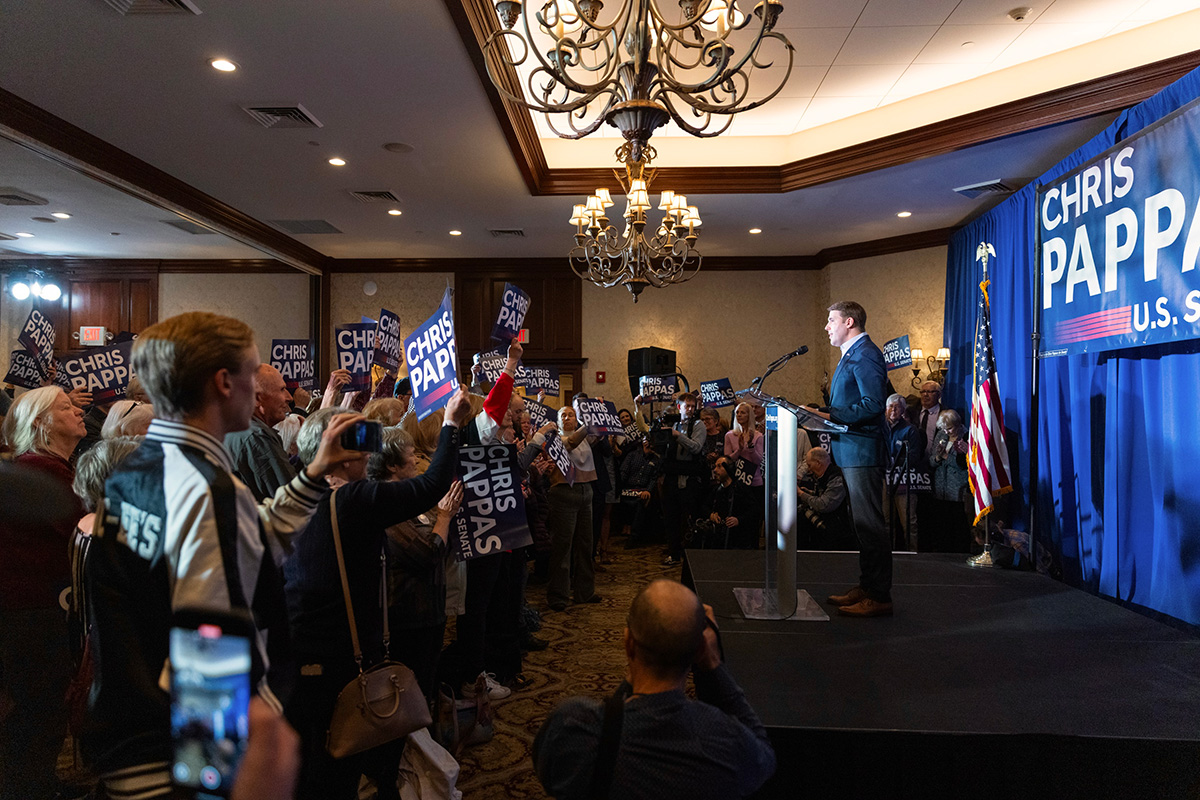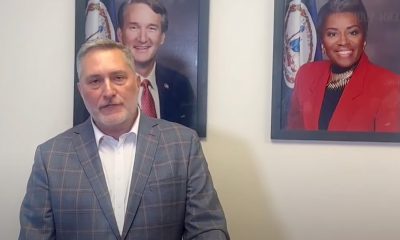Cape Cod This Summer

RENT on Cape Cod this summer! Provincetown, Truro, Wellfleet & Eastham. Full weeks, shorter stays. Houses, condos and cottages. In-town, on the water, in the woods. Great dates still available. Don't miss out on the sun, sand and fun this summer. Visit vacationcapecod.com to view our availability or call Maggie at 508-349-9000. Kinlin Grover Vacation Rentals Group at Compass.

U.S. Federal Courts
Federal judge scraps trans-inclusive workplace discrimination protections
Ruling appears to contradict US Supreme Court precedent

Judge Matthew Kacsmaryk of the U.S. District Court for the Northern District of Texas has struck down guidelines by the U.S. Equal Employment Opportunity Commission designed to protect against workplace harassment based on gender identity and sexual orientation.
The EEOC in April 2024 updated its guidelines to comply with the U.S. Supreme Court’s ruling in Bostock v. Clayton County (2020), which determined that discrimination against transgender people constituted sex-based discrimination as proscribed under Title VII of the Civil Rights Act of 1964.
To ensure compliance with the law, the agency recommended that employers honor their employees’ preferred pronouns while granting them access to bathrooms and allowing them to wear dress code-compliant clothing that aligns with their gender identities.
While the the guidelines are not legally binding, Kacsmaryk ruled that their issuance created “mandatory standards” exceeding the EEOC’s statutory authority that were “inconsistent with the text, history, and tradition of Title VII and recent Supreme Court precedent.”
“Title VII does not require employers or courts to blind themselves to the biological differences between men and women,” he wrote in the opinion.
The case, which was brought by the conservative think tank behind Project 2025, the Heritage Foundation, presents the greatest setback for LGBTQ inclusive workplace protections since President Donald Trump’s issuance of an executive order on the first day of his second term directing U.S. federal agencies to recognize only two genders as determined by birth sex.
Last month, top Democrats from both chambers of Congress reintroduced the Equality Act, which would codify LGBTQ-inclusive protections against discrimination into federal law, covering employment as well as areas like housing and jury service.
Congress
Pappas in Senate race focuses on costs, health care, and personal freedoms
Gay NH congressman hopes to succeed retiring US Sen. Jeanne Shaheen

U.S. Rep. Chris Pappas (D-N.H.) recently sat down with the Washington Blade for an exclusive interview following the official launch of his bid for New Hampshire’s open U.S. Senate seat, which is expected to be among the most closely watched contests of the 2026 midterm election cycle.
The congressman, who is serving his fourth term as the representative for New Hampshire’s 1st Congressional District, expects next year’s race will be “very high profile” and “challenging.” The New York Times, meanwhile, anticipates “an expensive and dogged affair.”
Senate elections tend to attract a disproportionate share of attention and resources especially in recent years as control over the chamber has tended to change hands more often and with smaller margins, but Pappas’s race is expected to be a bellwether for Democrats as they work to mount a comeback after last year’s electoral defeat.
At the same time, Pappas is gearing up for the battle over the Republican led reconciliation spending bill, with Democratic lawmakers exercising what little leverage they may have in the minority to fight against “disastrous cuts to Medicaid” while “finding other ways to protect what’s important to the people that we represent.”
Lawmakers on Sunday night gave the go-ahead for the GOP’s tax and spending package, but negotiations continue into this week as Speaker Mike Johnson (R-La.) works to appease conservative hardliners and swing district Republicans.
Granite Staters are “really concerned” about negotiations in Washington over spending, but also with the exigencies created by President Donald Trump over the past 100+ days of his second term, which have cropped up repeatedly during the town hall-style events in New Hampshire that Pappas has headlined over the spring.
“That’s part of the reason why things are so challenging here in Washington,” the congressman said. “Oftentimes you’re pulled in 10 different directions on any given day based on what this administration is trying to do, based on what Republicans in Congress are trying to do.”
“We’ve got to figure out how we can shed light on what’s happening, try to confront the damage, and use whatever tools we have to fight back,” he said, while remaining “focused on those things that matter most, whether that’s people losing their health insurance, cuts to programs like Social Security, and people’s access to their benefits.”
The US Senate election
“I’ve got a strong foundation of support” for the Senate race, Pappas told the Blade, noting “I’ve run four campaigns for the House in half the state of New Hampshire” whose congressional map is cleaved into halves with the congressman’s constituents in the eastern portion of the state while freshman Democratic Congresswoman Maggie Goodlander represents the 2nd District.
Following the announcement in March that New Hampshire’s senior U.S. senator, Jeanne Shaheen (D), would not be seeking reelection next year, “I spent the first couple weeks,” Pappas said, “talking directly with folks all across New Hampshire to see what was on their minds, and increasingly, I was hearing from people that they wanted me to jump into the race.”
The sentiment was shared by Shaheen and the rest of the state’s congressional delegation — Goodlander and U.S. Sen. Maggie Hassan (D) — who quickly endorsed Pappas’s bid. Speculation that the state’s popular former governor Chris Sununu, a Republican, might mount a formidable challenge for the seat ended with his announcement last month that he would not enter the race.
Even if Pappas is on the glidepath for the Senate, which is difficult to handicap so far in advance of November 2026, the election is expected to draw substantial attention and resources.
According to the Cook Political Report, of the Senate seats that will be up for grabs in the midterms, nine are held by incumbent Democrats and 19 by incumbent Republicans who are expected to easily win reelection, which leaves just five races whose outcomes are less certain and which therefore are likely to earn most of the attention and resources next year: The blue-leaning open seat in New Hampshire, an open seat in Michigan that is currently deemed a toss-up, the seat in Georgia held by incumbent Democratic U.S. Sen. Jon Ossoff, which is also considered a toss-up, and the red-leaning seats held by incumbent GOP U.S. Sens. Susan Collins of Maine and Thom Tillis of North Carolina.
While the maps present long-shot odds of Democrats regaining control of the upper chamber even though Republicans had reclaimed the Senate majority last year by flipping just four seats for a modest margin of 53-47, races like Pappas’s are expected to be testing grounds for the minority party’s major campaigns midway through Trump’s second term.
New Hampshire has long been a political battleground where elections tend to be close and voters tend to split the ticket. According to the Cook Partisan Voting Index, only three U.S. states are less politically partisan: Michigan, Wisconsin, and Georgia. The determination is based on data collated from the 2020 and 2024 presidential elections, where voters in both of the Granite State’s two congressional districts favored Joe Biden and Kamala Harris over Donald Trump while supporting the Republican gubernatorial nominees, Chris Sununu and Kelly Ayotte.
Shaheen has “really built a brand that’s based on serving people and delivering for the constituents of New Hampshire,” Pappas said. “So that’s the kind of work that I want to carry on — but recognizing, in this time, that we really have to stand up and fight and be a part of our response to what this administration is doing.”
“We do need to re-establish some basic checks and balances here in Washington, so that there is oversight and accountability of an administration that’s blowing through all the guardrails and is really estranged from public opinion and from the Constitution,” he said, while continuing “to find ways to meet people where they are, to hear their stories, and to connect the fight here in Washington to people’s lives back home.”
Responding to the needs of Granite Staters
Specifically, while “people are responding to a lot of different stories,” Pappas highlighted concerns about “cuts to specific programs, the fact that we’ve got 80,000 VA employees that are going to be fired,” and over the direction in which care for veterans is headed under the new administration.
“The big fight right now is around health care,” he said. “It’s around defending Medicaid coverage, ensuring we’re going to continue to have a Medicaid expansion program in New Hampshire, which is something that I’ve worked with then-Gov. Maggie Hassan to implement, and whether we’re going to have tax fairness and prevent huge tax breaks from going to the wealthiest Americans and the biggest corporations.”
Asked about cuts to medical research that are impacting research universities across the country, Pappas said the issue has been raised often in discussions with people in his home state.
“The University of New Hampshire does a tremendous amount of research with federal funds,” he noted, “and that’s something that we’ve worked hard through the years to advocate for, and it’s really important for the university to continue to be able to do that work and help us understand the world around us, how it’s changing, and how we can respond to protect public health, for instance, to protect our communities against sea level rise — those are just important priorities.”
Unlocking “breakthroughs in science and medicine” is important for America’s global competitiveness, the congressman added, whether by “homegrown talent here in the United States or research scientists from around the world that want to come to our country and share their expertise and help the United States move forward.”
“Donald Trump has decided that universities and colleges are a political enemy of his, and he’s trying to punish them, but in doing that, he’s really short changing our economy and the future of the United States,” Pappas said, adding, “most people recognize that, especially people in New Hampshire.”
The congressman recounted how he was able to work closely with his colleagues in the state’s congressional delegation to leverage public pressure and influence by labor unions to reinstate probationary employees at the Portsmouth Naval Shipyard who were let go following drastic cuts to the federal workforce under the Trump-Vance administration.
“It’s really critical to the future of that facility, which rehabilitates our nuclear submarine fleet and has nearly 7,000 civilian employees,” Pappas said. “So that was one case where we found that we were able to get a lot of local attention and support around an issue, and perhaps that news made it all the way back here to the Defense Department who were concerned about public pressure.”
“We’ve got a lot of long-time employees at that shipyard,” along with “a lot of new people that have been brought on board as a result of an expansion over the last several years,” the congressman noted. “Across the board, people want to know that we’re focused, especially on our families’ bottom line right now,” which is why it was important for him and his colleagues to “go to bat for a facility that’s really important to people’s livelihoods, but also to our overall economy” and for national security.
Moving forward, Pappas said, they will continue pushing back against “efforts to attack the right to organize and collective bargaining,” because “unions at the shipyard have a great relationship with management, but that could be disrupted by political efforts from this administration to attack labor unions.”
The economy and protecting personal freedoms
The congressman said that while “we need to try a little bit of everything to try to identify what is going to break through,” at the same time, “I do have the sense that the last election hinged on the economy, that every election really hinges on the economy, and those are the issues that are going to be, I think, most salient to folks next year.”
“We’ve got to make sure that we’re making progress at addressing inequities in the economy and are lowering costs,” he said. “Right now, the top issues that I hear about in New Hampshire include the high cost of housing, the lack of affordability of child care, the fact that our health care system is still inaccessible, and far too expensive for most people to be able to get the care that they need.”
“We’re not getting any of that from Republicans right now,” Pappas said, when it comes to the “work we have to do to level the playing field in our economy,” adding, “they talked a big game in the last campaign about lowering costs, but they’re taking no meaningful action to do it, and so we need to be thoughtful about a really forward-thinking agenda that can focus on how we allow people to get ahead and stand in this economy.”
Asked about whether and to what extent Pappas will focus his messaging on the president’s tariffs, he noted “people are already responding,” especially in “a state like New Hampshire that has a longstanding close relationship with Canada.”
He continued, “88 percent of our small businesses import something. We have a lot of exporting businesses that rely on their markets overseas, including in places like Canada and China, and some of those markets are going away because of the tariffs that have been slapped on U.S. goods that we export.”
Trump’s trade war “has generated so much instability in our economy, it’s really hard for our small businesses to navigate,” Pappas said, with these new “disruptions to supply chains and the threat of increased costs” following a “really tough 5-year period from inflation and workforce shortages to the pandemic that predated that.”
“This is an issue that I think brings people together across party lines,” Pappas said. “Folks understand that we have trade agreements in place that have been negotiated [and] supported on a bipartisan basis, including” the United States-Mexico-Canada Agreement, “which was renegotiated during the first Trump administration.”
The congressman continued, “it only makes sense to move forward in a way where we are focused on how we can make more things in the United States, but also recognize that we can’t make everything and we can’t go it alone, so we need to be working with close partners like Canada, and there’s no there’s no reason for this sort of trade war that only hurts our businesses and our ability to create jobs and have a thriving economy.”
“I also think, with respect to personal freedoms, in the wake of the Dobbs decision, we have to continue to take steps to re-establish Roe v. Wade as the law of the land and defend reproductive freedom,” Pappas said.
“I’m the only candidate in this race right now, and I think regardless of who the Republican is, we’re going to be fighting for the Women’s Health Protection Act and to make sure that we’re re-establishing the precedent that Roe set for more than half a century, which is broadly supported in New Hampshire,” he said.
LGBTQ issues
A co-chair of the Congressional Equality Caucus, Pappas is the first openly gay member of Congress to represent New Hampshire. If elected, he would be the third out LGBTQ U.S. senator behind U.S. Sen. Tammy Baldwin (D-Wis.) and Laphonza Butler, who served from 2023 to 2024.
Trump, along with his Republican allies in Congress and appointees serving in his second administration, has undermined rights and protections for LGBTQ people on a variety of fronts, including by dismantling and defunding efforts to fight against HIV. Cuts to basic and clinical science research along with public health programs have been advanced by the president’s budget and the GOP lawmakers’ reconciliation package, as well as through the reorganization of the U.S. Department of Health and Human Services under Secretary Robert F. Kennedy Jr.
Now in the minority, House Democrats “will not be in the room negotiating, as much as we would love to tell the majority exactly how we feel about all these items,” Pappas conceded. At the same time, “to get a budget put in place and appropriations bills passed, you’ll need 60 votes in the Senate, which means you need some sort of bipartisan consensus, at least in that body,” which “could potentially be a difference maker in defending some of these programs that folks care about, that the president has sought to eliminate.”
“Services for people with HIV, access to health care, vital research — those are things that Americans broadly support,” the congressman said. “We’re going to stand up against it, and where there’s harm to people and important priorities, I’ll certainly be speaking out, and I know that members of the Equality Caucus will be taking that very seriously.”
“Many people in this administration,” Pappas said, “are not traditional Republicans and don’t support the same set of policies that we’ve seen even Republican presidents put in place,” like the PEPFAR initiative led by George W. Bush, “which has changed the trajectory of the treatment of HIV and AIDS around the world.”
“Now, they are attacking that program and its ability to provide care for people in some of the most vulnerable regions of the world, and it’s been reported that individuals in Africa have died as a result of not getting the treatments that they were counting on through that program,” the congressman noted.
He continued, “We really have a human responsibility to do whatever we can to meet the needs of people who are susceptible to disease or who have been exposed to it, and the fact that this administration is breaking with that long bipartisan tradition of research, of humanitarianism, I think is incredibly cruel, and it’s not what the United States should stand for.”
What has been especially frustrating, Pappas said, is the silence from Republicans in Congress including those who “have championed these programs for decades.”
“I don’t know what to say to that,” he said, except that “people need to be paying attention and we need to do everything possible to speak out and fight back against it” because “we can’t see an interruption in terms of the progress that’s been made in fighting disease and developing new therapies.”
Public health aside, when asked about how the Democratic Party should approach messaging on issues of transgender rights and gender identity, Pappas stressed that “Americans largely embrace equality” and people want others “to have the same rights and responsibilities.”
The congressman raised the Equality Act as an example — a bill that would protect Americans against discrimination on the basis of sexual orientation and gender identity in areas from housing to employment, which was reintroduced last month with a press conference headlined by Pappas and top Democrats from both chambers of Congress.
Democrats should not shy away from advancing bills that advance “fairness and equality before the law,” he said, “especially at a time where we know that the LGBTQ community is being targeted by really cynical political attacks.”
“Where I come from, in New Hampshire, we’ve adopted protections for trans individuals in our state’s non discrimination statutes,” Pappas noted, “and so I think when you come from an environment like New Hampshire, you understand that people do respect their neighbors for their differences.”
He continued, “We’re a live and let live state, and so I think it’s really consistent with who we are to be tolerant and embrace people of different identities and orientations. That’s who we are as Granite Staters. And I think people recognize that in order to have a future where everyone can live a full and productive life, you need to provide people with equality before the law.”
El Salvador
El Salvador conmemora el 17M bajo un clima de miedo y retroceso en derechos LGBTQ
Activistas denunciaron al gobierno de Nayib Bukele

El 17 de mayo se conmemora a nivel mundial el Día Internacional contra la Homofobia, Transfobia y Bifobia, recordando la eliminación de la homosexualidad como enfermedad mental por parte de la Organización Mundial de la Salud en 1990. Sin embargo, esta fecha también se ha convertido en un espacio de denuncia ante la violencia estructural e institucional que sigue afectando a la población LGBTQ en muchos países, incluido El Salvador.
Este año, la marcha conmemorativa del 17 de mayo en San Salvador fue más reducida que en ocasiones anteriores. Decenas de personas se reunieron para alzar su voz a pesar del temor creciente entre quienes integran la diversidad sexual y de género.
Las amenazas no son nuevas, pero sí más frecuentes en el contexto actual.
Activistas, colectivas y organizaciones de derechos humanos denuncian que el gobierno de Nayib Bukele ha profundizado un discurso y una práctica anti-derechos. Para muchas de estas personas, la visibilidad se ha vuelto sinónimo de riesgo.
Desde la Asociación ASPIDH, Valeria Mejía, coordinadora de monitoreo y evaluación, expresó que “a inicios de 2025, el presidente Nayib Bukele y su gobierno oficializaron una postura anti-derechos, profundizando las amenazas estructurales contra los derechos humanos en El Salvador”. Alegan que esto ha generado retrocesos concretos para la comunidad LGBTQ.
Mónica Hernández, directora ejecutiva de ASPIDH, ha sido enfática en sus declaraciones.
“Se está silenciando a las organizaciones defensoras de derechos humanos a través de amenazas o restricciones legales”, afirmó. Y exigió al gobierno restituir los mecanismos que protegían a la población diversa.
Una de las luchas históricas aún sin respuesta es la aprobación de una ley de identidad de género. Actualmente, las personas trans no pueden modificar su nombre y género en sus documentos legales, lo que las expone a tratos humillantes en hospitales, centros educativos, juzgados y otras instituciones públicas.
La falta de una legislación que apoye a las personas trans sobre su identidad de género sigue siendo una afectación, por lo que sufren discriminación institucionalizada, en hospitales, centros educativos, juzgados, entre otros, donde suelen enfrentar trato discriminatorio o negación de servicios por no coincidir su identidad de género con sus documentos legales, mencionó una vocera de la Mesa por Una Ley de Identidad.
En la marcha de este año, las calles no se llenaron como en otras ocasiones. El miedo a la criminalización fue evidente.
“Los agentes del CAM me dijeron que con este régimen me podían acusar de ser pandillera solo por ser trans y andar tatuada”, declaró una participante, temblorosa, al Washington Blade.
A pesar del temor, hubo presencia. Algunas organizaciones de base y colectivos de clase trabajadora mostraron su solidaridad. Entre ellas, el Movimiento por la Defensa de los Derechos Humanos de la Clase Trabajadora, quienes acompañan el caso de Carolina Escobar, una mujer trans despedida injustamente del ISDEMU.
Escobar también estuvo en la marcha.
“Hay que permanecer unidas las minorías, yo estoy acá a pesar de que he sufrido persecución por parte de la Policía Nacional Civil, por dar seguimiento a los casos de despidos injustificados del ISDEMU”, comentó.
La analista política y activista Bessy Ríos de la organización De La Mano Contigo no se mostró optimista con el panorama.
“Hay que prepararse para el peor de los escenarios y crear redes de apoyo entre nosotros”, recalcó durante la jornada conmemorativa.
La colectiva feminista también acompañó la marcha y compartió con otros colectivos mensajes de unidad.
“En tiempos difíciles, es cuando debemos unirnos más”, dijo una joven activista con una pañoleta verde en su rostro.
La represión no solo se percibe en las calles. Desde hace meses, muchas organizaciones LGBTQ han denunciado bloqueos al financiamiento internacional que sostenía proyectos de apoyo, atención psicológica y asesoría legal. Sin esos fondos, la lucha se vuelve más cuesta arriba.
Además, la anunciada Ley de Agentes Extranjeros —todavía en discusión— amenaza con imponer un impuesto del 30 por ciento a las donaciones provenientes del extranjero. Esto pondría en jaque a decenas de ONG que trabajan directamente con poblaciones vulnerables, incluida la diversidad sexual.
La consigna en esta fecha ha sido clara: la lucha no se detiene. Incluso con menos recursos y bajo amenazas, quienes se organizaron para conmemorar el 17 de mayo lo hicieron con la firme convicción de que los derechos humanos no se negocian.
Desde las pancartas hasta las intervenciones públicas, el mensaje fue contundente: el Estado salvadoreño debe cesar toda forma de discriminación hacia las personas LGBTQ y garantizar políticas inclusivas que aseguren su acceso a la salud, la educación, la justicia y el empleo.
En cada paso, se entretejía el recuerdo de quienes ya no están, y el deseo ferviente de un futuro distinto.
“Marchamos por quienes no pudieron llegar hoy, por quienes tienen miedo, por quienes ya no están. Seguiremos exigiendo respeto y dignidad”, expresó una activista.















